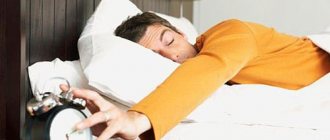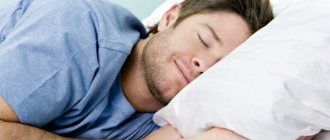How many days can a person live without sleep? An interesting question that often appears on the Internet. Sleep is a natural human need, no different from food or air. Its complete deprivation quickly leads to death , which occurs after 11-15 days without night rest.
However, lack of sleep does not always occur by the will of a person. There are often medical reasons behind this. It happens that the sleep function is simply turned off due to a head injury or diseases of the nervous system. hallucinations within 2-3 days . However, this does not happen in patients with “sleep function disabled.” In short, they can stay awake for years and feel great.
The article is for informational purposes only. If you have health problems, you should consult your doctor in person. Self-medication is unacceptable!
Animal experiments
Experimental somnology was born in the 19th century. Its founder was a Russian woman, doctor Maria Mikhailovna Manaseina. In her practice, she encountered the death of a patient from insomnia that lasted nine days, and decided to conduct experiments on animals to find out the meaning of sleep for a living organism. Manaseina and her assistants forced puppies at the age of two to three months to stay awake, influencing them with caresses and touches until they died of fatigue - usually this happened after five to six days. If the puppies were deprived of food but allowed to sleep, they lived an average of 25 days. So it became clear that sleep is absolutely necessary to ensure the vital functions of the body.
Then similar experiments were carried out on rats: “carousels” were built for them, which did not allow them to sleep, and in case of the slightest drowsiness, the rodents were thrown into the water. When the animals died from artificially induced insomnia three weeks later, their bodies were opened and all sorts of damage was discovered: the presence of liquid exudate in the lungs and trachea, stomach ulcers, internal hemorrhages, etc. About a day before the death of the rodent, the encephalogram showed a drop in amplitude, and, even if the experiment was terminated, the animal could not fall asleep and inevitably died. This drop in EEG amplitude indicated irreversible disturbances in brain function caused by sleep deprivation.
University of Chicago professor Alan Rechtshaffen, who conducted experiments on rats in the 1980s, discovered three main effects of chronic total sleep deprivation: metabolic, immune and hormonal. From insomnia, the rats lost weight, although they ate even more than usual, and quickly became susceptible to infections. Microbes penetrated the circulatory system and internal organs, which are usually sterile, and as a result the animals died from sepsis.
Current
- The Earth-2 supercomputer will show the future of the Earth
- Genes for long life found in fish
- People have violated an important natural pattern in the oceans
Why do you need sleep?
The need for rest alone cannot explain the dream. You can relax after a long day of work by simply lying in bed or sitting comfortably in a rocking chair. But no, at a certain time a person necessarily falls asleep.
Scientists suggest that sleep is a special kind of reboot of the nervous system. During it, the database of our “internal computer” is reset, what is needed is archived, what is not needed is sent to the trash or erased forever. Without this process, the normal functioning of the brain and all the systems it controls is impossible.
Inhumane experiments on humans
By the time Rechtschaffen dissected animals killed by insomniacs, people had already set several records for survival without sleep. One of the first was radio host from New York, 33-year-old Peter Tripp: as part of a “sleepless marathon,” he stayed awake for eight days live, broadcasting from a glass booth in Times Square. True, out of 201 hours of forced insomnia, he spent 66 hours doping (taking the stimulant drug Ritalin). On the third day, Tripp became emotionally unstable, on the fourth, he could not pass attention tests, and then he began to experience hallucinations and paranoia. He imagined insects in the stains on the table, spiders in his shoes, and a murderous undertaker in the doctor. At one point, he even insisted that he was not Peter Tripp, but perhaps this was not the effect of insomnia, but of a maintenance drug. After spending eight days without sleep, the showman did not die, but after sleeping off, he lived to be 73 years old. But, as his family said, after the marathon Tripp became completely different: more irritable and depressed. The experiments did not end there. The Guinness Book of Records includes the American Randy Gardner, who in 1963 spent 264 hours and 30 minutes without sleep. The young man was 17 years old and took part in an experiment led by researchers from Stanford University. Project supervisor John Ross said the teenager's mental abilities and behavior changed: he quickly became angry and moody, could not concentrate, and soon began to hallucinate and paranoia, like Tripp. For example, on the fourth day, Randy imagined himself to be a different person - a participant in the annual American football game. The street sign seemed alive to him. On the last day, he was unable to complete a math test for sequentially subtracting the number 7 from 100. Having reached 65, he fell silent and, when asked about the reason for stopping, replied that he had forgotten what he was doing. However, on the last day, Randy successfully held a press conference and his record was counted. Gardner had a number of followers, and the record was broken within two weeks. But representatives of the Guinness Book of Records stated that they would not register any more such experiments, as this could pose a threat to human health.
However, this warning did not stop people. In February 1964, Finn Toimi Soini spent 276 hours without sleep. The Englishman Tony Wright, who in 2007 did not sleep for 266 hours while competing with Gardner, did not know about this.
Some sources mention the maximum record without sleep: 18 days and 17 hours. It was installed by a British woman from Peterborough, Cambridgeshire, in April 1977. A woman stayed awake for 449 hours during a rocking chair marathon. But this was not a scientific experiment; no one stood over her with instruments and measured the EEG. Therefore, one cannot be sure that she did not take a nap for a minute or two in almost 19 days. Gardner's record of 11 days remains a documented example of human survival without sleep.
Without sleep
Day 1. The man did not sleep for 24 hours. Fatigue and irritability appear, albeit insignificant or even unnoticeable to a person, and blood pressure rises. After a sleepless day, a person immediately plunges into the REM sleep phase, and if no one and nothing distracts him, he will instantly fall asleep.
Day 2. The psyche is attacked by chemical processes occurring inside a person. About 50% of information is not absorbed. If there is no sleep for two days, brain cells begin to deteriorate, and the load on internal organs increases many times over.
Day 3. Changes in hormonal levels, increased production of the stress hormone, and as a result – a decrease in the rate of regeneration of brain cells. The emergence of “confusion”, loss of facts. The state is depressive, up to a neurotic disorder.
Days 4–5 (and sometimes the third) Paranoia, auditory and visual hallucinations, speech impairment.
Scientific research has shown that prolonged lack of sleep reduces the body's ability to absorb glucose, which ultimately leads to the development of diabetes.
Further, if a person does not die, irreversible processes occur:
- convulsions
- slurred speech
- tremor
- memory loss
Therefore, experimenting with sleep is highly undesirable. A different picture occurs with those who do not sleep against their will. Insomnia, or insomnia translated from English, torments about 30% of the world's inhabitants. And this is every third of us.
Can a person die from lack of sleep?
Don't try to repeat these records! Doctors know that lack of sleep is extremely harmful to the body and can even lead to death. About 40 families in the world suffer from a rare incurable hereditary disease - fatal familial insomnia. This genetic prion disease is accompanied by the formation of amyloid plaques in the thalamus (the part of the brain responsible for sleep) and sooner or later leads to total sleep deprivation. Severe insomnia, panic attacks, hallucinations end in complete degradation of the personality: the person stops speaking and does not react to the environment, and then dies. The disease, first described 40 years ago, lasts 7–36 months. There is still no treatment, and only gene therapy could help, but it is not yet approved for ethical reasons. As well as experiments on long-term sleep deprivation.
Why not getting enough sleep regularly is also harmful
Not only a long lack of sleep, but also a constant lack of sleep leads to negative consequences for the body. For example, when every day you rest for 5-6 instead of the prescribed 7–8 hours. The effect can accumulate and manifest itself in symptoms similar to those experienced during extreme wakefulness:
- Fatigue and drowsiness.
- Poor concentration, problems with alertness, memory and coordination.
- Irritability, sudden mood swings.
- Increased appetite The effects of going more than 24 hours without sleep / MedicalNewsToday.
- Development of anxiety.
- Deterioration of immunity.
- Raising How Long Can You Go Without Sleep? Function, Hallucination, and More / Healthline of accident risks.
- Increased risk of cardiovascular diseases (hypertension, stroke).
- Increased likelihood of sleep apnea.
- Reduced What to know about sleep deprivation / MedicalNewsToday fertility (the likelihood of conceiving a child).
Experiments on rats have proven that lack of sleep negatively affects the body's ability to heal L. Mostaghimi, WH Effects of Sleep Deprivation on Wound Healing / Journal of Sleep Research wounds and formation No sleep means no new brain cells / BBC News new brain cells.
If you don't sleep for 2 days in a row
Of course, situations may arise when you have to stay awake for 2 days in a row.
This is a more severe condition for the body, which can affect the functioning of internal organs and will manifest itself not just as drowsiness, but also as a malfunction, for example, of the gastrointestinal tract. From heartburn to diarrhea, the range of sensations experienced can be very diverse. At the same time, a person’s appetite will increase (an obvious advantage will be given to salty and fatty foods) and the body, in response to stress, will launch the function of producing hormones responsible for insomnia. Oddly enough, it will be difficult for a person to fall asleep during this period, even with a strong desire. After 2 sleepless nights, glucose metabolism in the body is disrupted, and the functioning of the immune system deteriorates. A person becomes more open to the effects of viruses. After two sleepless nights, the strongest person will become:
- absent-minded;
- inattentive;
- his concentration will deteriorate;
- intellectual abilities will decrease;
- speech will become more primitive;
- Coordination of movements will deteriorate.
Office passions
Scientists talk about the effect of sleep duration on metabolism
To avoid seasonal sleep problems, the main condition for office workers is to stay in a place with daylight as much as possible. According to the scientist, advanced companies that care about the health of their employees even use special light lamps that simulate sunlight in the workplace.
The somnologist explained that ordinary artificial lighting does not have this effect, because it has a spectrum different from the spectrum of sunlight. On the contrary, it enhances the negative effect of incoordination in nature, since an excessive amount of lighting devices, any gadgets, computers, especially in the evening, disrupts the production of melatonin.
Recently, clerks have the opportunity to sleep right in the office - special capsules for daytime rest are gaining popularity around the world. In the West, this trend is widespread; domestic employers, for the most part, are not yet ready for such a step. However, some large companies have had capsules for several years.
Dream
Photo: Global Look Press/Jenny Acheson
The physiotherapist considered the scientific conclusion about the most harmful position for sleeping to be far-fetched
The Izvestia correspondent was lucky enough to try out this miracle of technology for himself, but was unable to fall asleep there. Perhaps the fact that it happened in the morning, after a full night's sleep and a large glass of coffee, played a role.
Lying down in someone else's office to rest turned out to be a simple matter and not requiring any special liberation - you lie down in a chair, a large hemisphere covers you from above, a blanket on your feet, and headphones on your head. At the beginning of the session, a wave of vibrations runs through the chair, relaxing music sounds - it’s time to sleep. But for some reason I can’t sleep—thoughts about past negotiations and upcoming matters begin to swarm in my head, it’s very convenient, no one bothers me. Attempts to force oneself into nirvana have the opposite effect. The remaining time passes in a struggle with myself, finally the music becomes louder, the chair vibrates again - it’s time to go to work.
“When a person is at their peak of activity, there is no need for him to go there. If he processes a large amount of data and the reaction slows down, or there was some important meeting and relaxation is needed, or he cannot work at a high pace, puts off important things until tomorrow and begins a strategy of surviving until the end of the working day, then the capsule will extend the period of activity for about 3-4 hours,” Viktor Khodanov, managing partner of EnergyPoint, a Russian developer and manufacturer of capsules for restoring sleep, told Izvestia.
A whole team of Russian specialists of various profiles, from scientists to musicians, is working on the constant improvement of the gadget. “In our laboratory, the rate of falling asleep is about 70–80%. We look at the encephalogram, and the appearance of certain rhythms on it indicates that the brain has fallen into a state of superficial sleep and the necessary processes of restoring cognitive abilities have begun - memory, attention, concentration, assimilation of information. It’s like a reboot, it doesn’t replace night’s sleep, because there is no deep phase, but it makes it possible to extend the working day.”
Dream
Photo: Getty Images/Todd Warnock
Some people believe that napping during the day is harmful because, having enough sleep, a person worsens the quality of night sleep. “A short 20-30 minute nap, no more, really increases a person’s performance, alertness and cognitive functions,” confirms somnologist Alexander Kalinkin. “Therefore, from a performance point of view, it is useful. It can worsen the likelihood of falling asleep at night, reducing the so-called sleep pressure in the evening, but only over a longer period of time.”
According to the scientist, it is important to understand why a person becomes drowsy: he sleeps little at night or he has some kind of pathology. How to distinguish temporary difficulties from chronicles? Acute insomnia occurs in any person and is associated with stressful situations, and these can be both negative and positive emotions. If after the disappearance of the stress factor this situation does not recover and continues for more than three months, it is time to go to the doctor.
Scientists talk about the genetic causes of insomnia
Dangerous consequences
If a person does not sleep for five days, he begins to go crazy. In this case, the patient is capable of fainting at any time, but is no longer able to fall asleep on his own. The individual suffers irreversible harm, deformations affect not only the cortex, but also the subcortex of the brain, and the nervous system collapses. Increasing suspicion takes on the characteristics of phobias, panic attacks become more frequent, and hallucinations become noticeable. A little later, health is disturbed to an extreme degree - the personality loses touch with reality.
Behavioral reactions are transformed in any direction; it is impossible to predict the logic of actions. If you don't sleep for 160 hours, the damage to your health is irreversible. Hormonal destruction affects all life support organs. A decrease in the natural immune response opens the gates to all viruses; the slightest infection is enough for the patient to cause dynamic progress of pathologies.
The doctor compares the condition of a patient who has not slept for 5 days in a row with the condition of a drug addict after taking a dose. Retardation of consciousness, violation of the boundary between reality and fiction, relaxation of the sphincters, dulling of the pain threshold - this is a small list of destructive changes.
If you do not sleep further, such a patient will not live long. The rehabilitation period may be delayed, and some pathological changes in the body will be irreversible. The extreme ones include: death of the cellular structure of the brain, failures of metabolic processes, liver and kidney diseases, problems with the heart and blood vessels.









